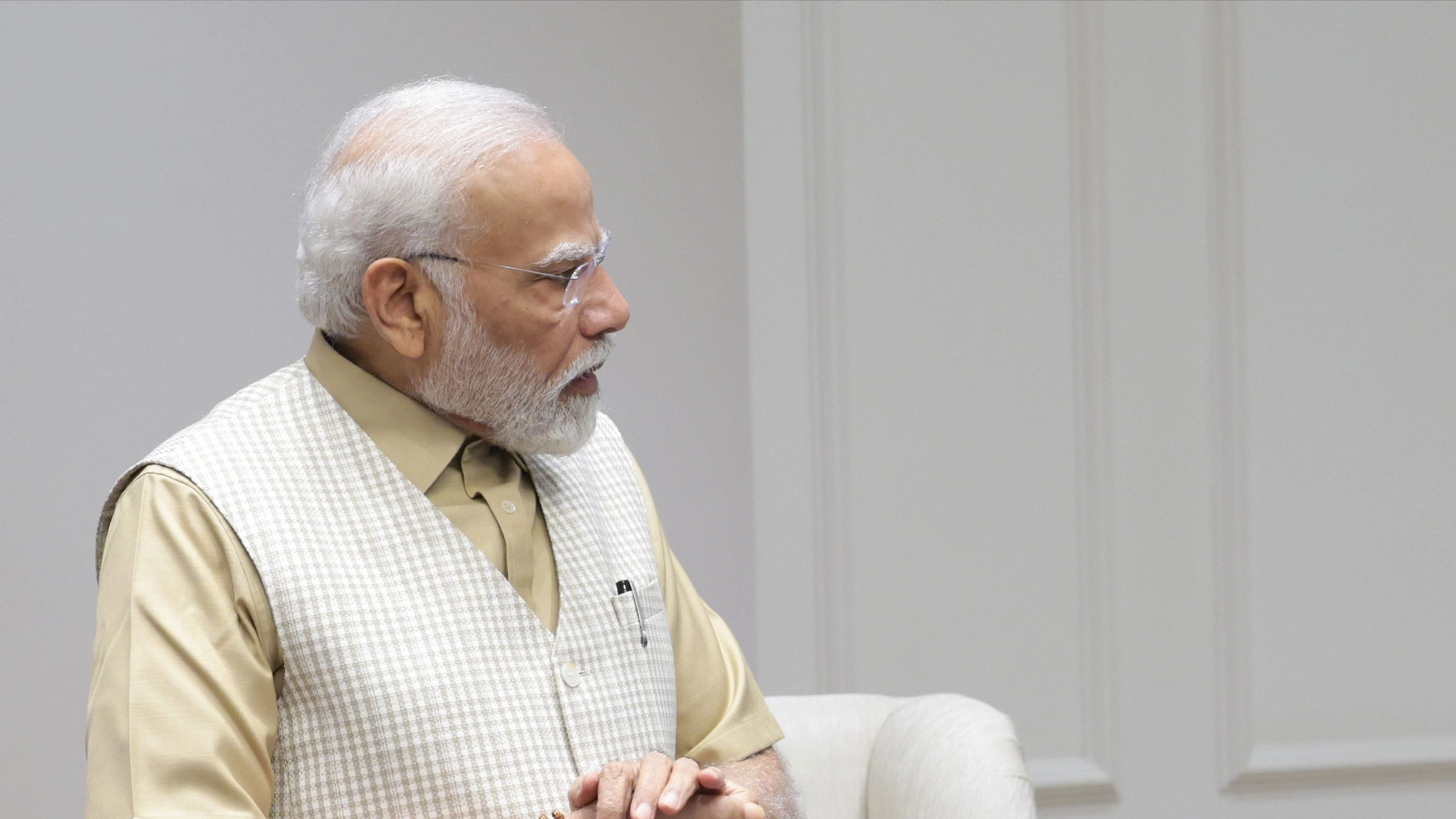
New Delhi: Prime Minister Narendra Modi
Credit: PTI Photo
PM Modi, in an exclusive interview with news agency PTI, spoke on his vision behind India's proposal of including the African Union in G20 and the biofuel alliance that the country has envisioned.
India has proposed making the Africa Union a permanent member of G-20. How will it help in giving a voice to the global south a presence. why is that voice important to be heard in the international fora.
Before I answer your question, I would like to draw your attention to the theme of our G20 Presidency - ‘Vasudhaiva Kutumbakam – One Earth, One Family, One Future’. It is not just a slogan but a comprehensive philosophy that is derived from our cultural ethos.
This guides our outlook within India and towards the world too. Look at our track record within India.
We identified districts that were earlier labelled ‘backward’ and neglected. We brought a fresh approach and empowered the aspirations of the people there. The Aspirational Districts programme was launched. It is bearing wonderful results with many of these districts showing significant progress. We identified villages and households without electricity and electrified them.
We identified households without access to drinking water and provided 10 crore tap water connections.
Similarly, we reached those without facilities such as sanitation and bank accounts, enabling access and empowerment.
This is the approach that guides us even at the global level. We work for the inclusion of those who feel their voices are not being heard.
Take the example of health. We believe in the vision of ‘One Earth, One Health’. This is manifesting itself in different ways.
India’s ancient systems of Yoga and Ayurveda are helping the world bring a paradigm shift in the focus towards health and wellness.
During Covid-19, our approach was not that of isolation but of integration. Despite our constraints, we assisted nearly 150 countries of the world with medicines and vaccines. Many of these countries were from the Global South.
There have been many climate meetings over the decades. These discussions, despite the best intentions, would end up revolving around who is to blame.
But we took a positive and affirmative approach with a ‘can do’ spirit. We set up the International Solar Alliance and took the initiative to bring countries together under the vision of ‘One World One Sun One Grid’.
Similarly, we started the Coalition for Disaster Resilience so that countries across the world, especially developing countries, learn from each other and build infrastructure that is resilient even during disasters.
We have also worked with small island nations of the world to further their interests, including under the Forum of India and Pacific Island Countries.
When we say we see the world as a family, we truly mean it. Every country’s voice matters, no matter the size, economy or region. In this, we are also inspired by the humane vision and ideals of Mahatma Gandhi, Martin Luther King Jr, Nelson Mandela, and Kwame Nkrumah.
Our affinity to Africa is natural. We have had millennia-old cultural and commerce ties with Africa. We have a shared history of movements against colonialism. As a youthful and aspirational nation ourselves, we also relate to the people of Africa and their aspirations.
In the last few years, this relationship has got even stronger. One of the earliest summits that I held after becoming Prime Minister was the India-Africa Forum Summit in 2015. Over 50 countries from Africa participated and it greatly strengthened our partnership.
Later, in 2017, for the first time, a summit of the African Development Bank was held outside Africa, in Ahmedabad.
Africa is a top priority for us even within the G20. One of the first things we did during our G20 Presidency was to hold the Voice of the Global South summit, which had enthusiastic participation from Africa.
We believe that no plan for the future of the planet can be successful without the representation and recognition of all voices. There is a need to come out of a purely utilitarian worldview and embrace a ‘Sarva Jana Hitaaya, Sarva Jana Sukhaaya’ model.
You launched the Solar Alliance a few years ago. Now you are proposing a bio-fuel alliance, which we believe you will unveil at G-20. What is the objective and how will it help import-dependent countries like India on energy security.
There is a big difference between the world of the 20th century and the 21st century. The world is more interconnected and interdependent, and rightly so. But we must understand that in an interconnected and interdependent world, the greater the capacities and capabilities of the countries around the world, the greater the global resilience.
When the links in a chain are weak, each crisis further weakens the complete chain. But when the links are strong, the global chain can handle any crisis, utilizing each other’s strengths.
In a way, this thought can also be seen in Mahatma Gandhi’s vision of self-sufficiency, which continues to be relevant at a global level too.
Further, the protection and preservation of our planet for our future generations is a shared responsibility that needs to be given top priority.
We have been making great progress in climate-centric initiatives within India.
India ramped up its solar energy capacity 20-fold in just a few years. India is among the top four nations in the world in terms of wind energy.